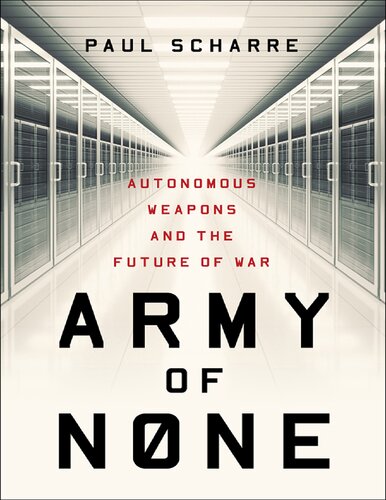
Army of None
Autonomous Weapons and the Future of War
کتاب های مرتبط
- اطلاعات
- نقد و بررسی
- دیدگاه کاربران
نقد و بررسی

March 19, 2018
This important book illuminates what may be a fundamental change in the nature of war: the possibility of a future in which the majority of the fighting is done by autonomous weapons powered by artificial intelligence. Unlike drones, these machines make lethal decisions without a human “in the loop.” Scharre is an expert in the field, having served as a DoD analyst responsible for the U.S. policy regarding autonomous weapon systems (“Spoiler alert: it doesn’t ban them”). He talks to other experts, witnesses demonstrations, and analyzes historical examples to inform this exploration of current weapons (such as the capabilities of the Aegis ballistic missile defense system, which can rapidly shoot down ballistic missiles) and the ethical challenges surrounding autonomous weapons, including reliance on fallible tools (such as those of the Patriot air defense systems, which caused friendly fire incidents among U.S. aircraft in Iraq) and the likelihood of an arms race spurring investment in ethically questionable technology. This excellent primer is of interest to the general reader and a must-read for those who have a professional interest in military topics but are not up to speed on AI and robotics.

Former Army Ranger Scharre, the director of the Future of War Initiative at the Center for a New American Security, looks at the technical, strategic, and ethical questions raised by autonomous weapons, which are closer to reality than many civilians may realize.Mechanical weapons go back at least as far as the Civil War-era Gatling gun, which was expected to save lives by allowing a small crew to replace many riflemen. It led instead to the mass slaughter of World War I, when machine guns mowed down thousands of attacking infantrymen. Today's drones allow air strikes without exposing pilots to enemy fire. But in those cases, human beings make the decision whether to fire. What happens if human judgment isn't part of the decision-making loop? The author lists several weapons that pose that question, including missiles that could be sent to a location where enemy ships are known to be in order to seek out targets to attack. While such weapons are currently feasible, most military establishments are reluctant to deploy them. There is the ethical issue about using lethal force without a human taking the responsibility of killing, and there is also the strategic dilemma about starting an arms race. The technical question of creating autonomous control systems is already being tackled by makers of everything from vacuum cleaners to self-driving cars. Can robot tanks or bombers be far behind? Scharre looks at all these issues, talking to experts from the Pentagon, international peace organizations, and the robotics scientists who are pushing the boundaries of artificial intelligence. He also gives first-person reports on drone tests and other leading-edge technological developments. The author puts it all in the context of military history, including his own combat experience. While there are no firm conclusions, it is clear that autonomous weapons are on the horizon and that decisions about whether--and how--to use them will be critical factors in the future of warfare.A clear, well-written, and richly documented discussion of an issue that deserves deep and careful study.
COPYRIGHT(2018) Kirkus Reviews, ALL RIGHTS RESERVED. (Online Review)

March 15, 2018
The Killer Robots are coming! Or maybe not, writes Scharre, a former Army Ranger and current defense analyst, in this detailed, nuanced, open-minded look at an incredibly complex and technical subject. Scharre uses his own expertise, extensive interviews with developers and government officials, and plenty of science-fiction analogies to analyze the field of robotics and artificial intelligence as they apply to current and future military planning and development. Balanced and appealing to lay readers, this overview discusses many aspects of autonomous weapons (systems capable of selecting and engaging targets without human control) that readers may have not considered before. The result is a page-turner pertinent for anyone interested in the current state and future of this technology and the ethics and philosophical aspects of high-tech warfare. It is apparent that Scharre wrote this with the caring awareness of what can go wrong that only a combat veteran can provide. Army of None will spark important discussions as it empowers readers with knowledge about a subject with enormous implications.(Reprinted with permission of Booklist, copyright 2018, American Library Association.)

























دیدگاه کاربران